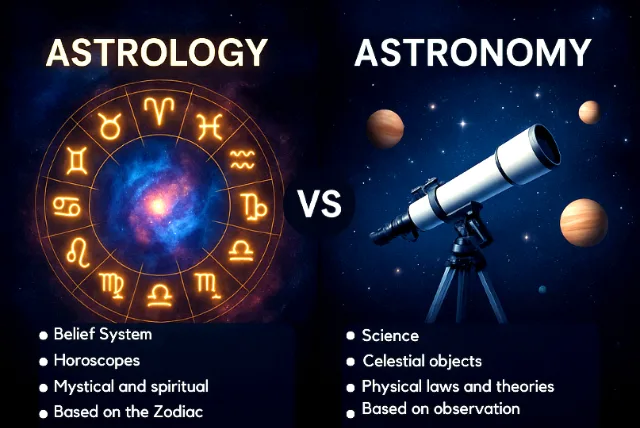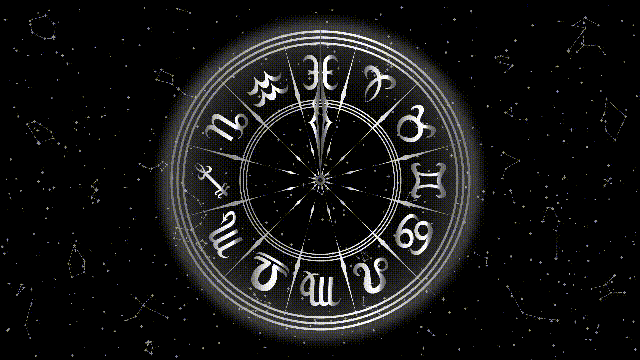Astronomy vs Astrology: scientific and cultural traditional belief system
Confused about astronomy and astrology? Here, we explain the differences between the two, from scientific study to belief system.
Author -Babita Saini

Over 70% of people confuse astronomy with astrology. While both sound similar, their purpose and approach are very different. Astronomy is a scientific study, while astrology is a belief system. Knowing the difference helps in understanding their value in modern times.
Astronomy and astrology used to be closely connected. In ancient societies, from Babylonia and Egypt to Greece and even during the Middle Ages, people who studied the stars were both astronomers and astrologers. The two fields began to separate during the Renaissance as science became more organized. At that time, scholars started to move away from astrology.
Despite the rise of modern science, astrology still has a strong presence in society. It offers a more personal, spiritual link to the universe, giving people a sense of comfort and meaning in a cosmos that can seem very large and uncaring.
What is Astronomy?
Astronomy is the scientific study of celestial bodies like stars, planets, galaxies, and space phenomena. It is based on observation, data, and research.
Types of Astronomy
- Observational Astronomy – Study of stars and planets using telescopes
- Theoretical Astronomy – Use of models and mathematics to explain space events
- Planetary Science – Research on planets, moons, and asteroids
- Astrophysics – Study of the physical properties of celestial bodies
- Cosmology – Study of the origin and evolution of the universe

Pros of Astronomy
- Provides scientific knowledge about the universe
- Helps in space exploration and technology growth
- Encourages logical and critical thinking
Cons of Astronomy
- Requires high investment in research and equipment
- Limited access for common people
- Findings may take years to confirm

What is Astrology?
Astrology is the study of how planetary positions influence human life. It is widely practiced as a cultural and traditional belief system.
Types of Astrology
- Vedic Astrology – Ancient Indian system based on planetary positions
- Western Astrology – Based on zodiac signs and horoscopes
- Chinese Astrology – Based on the lunar calendar and animal signs
- Mayan Astrology – Ancient Central American system
For ancient Indian insights, explore our Vedic Birth Chart Analysis services.

Pros of Astrology
- Offers guidance in personal and professional life
- Provides psychological comfort to many people
- Deeply rooted in tradition and culture
Cons of Astrology
- Lacks scientific proof
- Predictions vary among astrologers
- Can create dependency and fear in decision-making
Astronomy vs Astrology
| Feature | Astronomy (Science) | Astrology (Belief) |
| Definition | Study of celestial bodies and space | Belief in planetary influence on life |
| Basis | Scientific observation and data | Traditions and interpretations |
| Types | Observational, Theoretical, Cosmology | Vedic, Western, Chinese, Mayan |
| Pros | Knowledge, space research, technology | Guidance, tradition, psychological aid |
| Cons | Costly, complex, slow results | No proof, inconsistent predictions |
| Goal | Understand the universe scientifically | Guide human life through planets |
Also Read: September 2025 Hindu calendar dates and Shubh Muhurats
Astronomy and astrology serve very different purposes. Astronomy is science-driven, while astrology is belief-driven. Both continue to attract interest, but only astronomy contributes to research and technology, whereas astrology remains a cultural and personal practice.
Recent Blogs
Palm Reading Marriage Line That Interpret Divorce and Separation
Best Sleeping Direction as per Vastu with 7 Sleeping Tips
7 Reasons Why You Should Wear Firoza Stone for Benefits
7 Benefits of Neelam Stone in Vedic Astrology
11 Lucky Plants for Home and Office That Bring Good Fortune
7 Ways to Remove Negative Energy from Home, Body and Mind